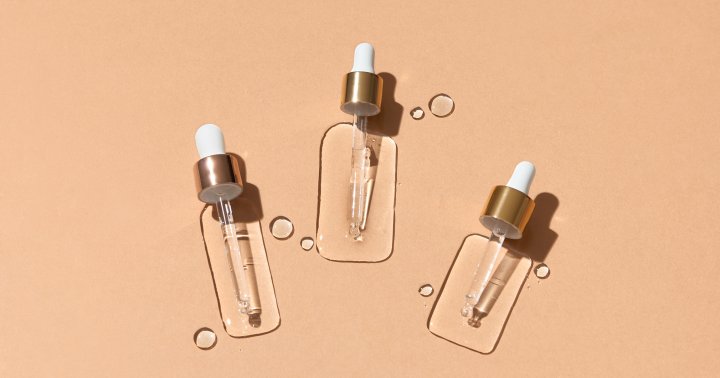Put An End To Stubborn PMS Bloating With These 6 Tips
Plus: why it happens in the first place.


August 5, 2022 — 11:02 AM
Even if your PMS isn't the worst (relatively speaking), odds are at some point in your life, you’ve experienced some cramping, gas, and bloating leading up to and during the first few days of your period. While the jury is still out on exactly what causes PMS to begin with, bloat is something that’s a little easier to pinpoint, although it can be incredibly frustrating and uncomfortable to deal with.
Fortunately, there are some helpful ways to manage and even cut down on bloating with intentional care. Fed up with hormonal bloating? You’ve come to the right place.
What causes PMS bloating.
Bloating as it ties into PMS is generally caused by water retention due to fluctuating hormones around the time of your period. “The main hormonal influence is estrogen,” explains OB/GYN Anna Cabeca, D.O. “It affects the sodium and water balance in your body. With rising estrogen, less sodium and water pass through your kidneys, so the more water your body retains.”
What's more, the changes in progesterone during this time can lead to occasional sleep changes and bloating.
Although the bloating should only last for the few days before your period begins and subside at the start, Cabeca notes that the fluid changes can even register to as much as 5 to 10 extra pounds on the scale.
6 tips for tackling PMS-related bloat:
1. Chart how you're feeling.
While tracking your PMS may not immediately impact bloating, it can help you recognize if there are any habits that are making it worse. “I always recommend that women chart their [PMS], ideally for at least a couple of months to share with their providers,” suggests OB/GYN Mary Jane Minkin, M.D. “If you can rate them for your provider, and how much they interfere with you before periods, that can be helpful.” Sometimes a longer term plan can be more effective than quick fixes.
Perhaps the last thing you’ll want to do before your period is squeeze in a workout, but a sweat session really may make you feel better and help alleviate some of the water retention. “I recommend regular exercise: not just the week before your period, but all month,” says Minkin. “The more the merrier—if you can exercise every day, that's terrific. Both aerobic and strength training help.”
The good news is that you don’t need to do an hours-long workout to reap the benefits—even a quick yoga flow can help soothe your belly and provide a confidence and endorphins boost.
3. Drink plenty of water.
Hydration is key even when you aren’t bloated, but it becomes more essential when dealing with PMS. “The more water you drink, the better you stave off water retention,” explains Cabeca. “Your kidneys need a constant supply of water to properly eliminate fluids and waste products from your body. If water is in short supply, the kidneys tend to hoard water, and bloat can set in.”
Not sure how much water you should be drinking? A science-backed water intake amount that women should aim for is 2.7 liters (we'll do that math for you: About 11.5 cups) each day, but make sure to consume even more if you’ve been particularly active.
4. Avoid refined carbohydrates and salty foods.
Adjusting your diet can also be useful when it comes to bloat, and if you're holding onto more water due to PMS, you will benefit from cutting down on salty and refined foods that can make bloating worse. “Eating sugary and processed carbs such as candy, sweets, white flour, bread, chips, cakes, and so forth leads to spikes in insulin levels and your body to hold on to more sodium, which in turn increases the fluid volume inside your body,” explains Cabeca.
The trap is that you’re probably going to be craving those foods during the days leading up to your period, so this isn’t to say you can’t eat the foods you love, but it’s helpful to be aware that they may exacerbate PMS and make your bloating worse. Instead, focusing on consuming a high volume of fruits and veggies during this time will be gentler on your body and help you feel better.
5. Leverage targeted supplements.
Speaking of nutrition, try adding more magnesium into your routine. “This versatile mineral (it’s involved in more than 300 enzymatic reactions in the body) may help fight water retention,” explains Cabeca. Of course, eating foods that contain magnesium such as nuts, dark chocolate, and leafy greens is a great option, but adding a supplement into the mix may also be of use. “I recommend 250 milligrams taken before bedtime (magnesium helps you sleep better),” she adds.
Supporting your gut health with a targeted probiotic can also be of value when it comes to easing bloat. Thankfully, mbg's probiotic+ is formulated with four strains intended to help aid with bloating and proper digestion.* It's not everyday you find a supplement that helps with abdominal comfort, but probiotic+ has got you covered.*
Outside of PMS, stress can also cause your body to bloat so you should be mindful of this during your time of the month to help regulate cortisol levels.
“Stress impacts the adrenal glands, also referred to as the stress regulators. High levels of stress will lead the adrenal gland to secrete higher levels of cortisol, which in turn triggers the release of glucose from your liver, which if not processed properly can lead to bloating, weight gain, fatigue, mood swings and all the [issues] we are trying to get rid of,” says Cabeca. However you like to burn off stress is up to you, but we recommend light exercise, meditation, key botanical bioactives, and even journaling.
Bloating, regardless of the cause, is never going to be comfortable, but by caring for your body (and mind) and staying aware of hormonal changes and the impact of your diet and exercise routine you can target this unfortunate and entirely normal PMS challenge.
When you're dealing with the lead-up to your period you may feel more inclined to cozy up in your bed and wait out the storm, but getting up and staying active, drinking plenty of water, eating a nutrient-dense diet, and taking advantage of targeted tools like a high-quality probiotic are all ways you can reclaim your life during this period (no pun intended) and cut through bloating to renew your confidence.*
If you are pregnant, breastfeeding, or taking medications, consult with your doctor before starting a supplement routine. It is always optimal to consult with a health care provider when considering what supplements are right for you.
https://www.mindbodygreen.com/articles/how-to-end-pms-related-bloating-with-foolproof-tips

 Konoly
Konoly 
































